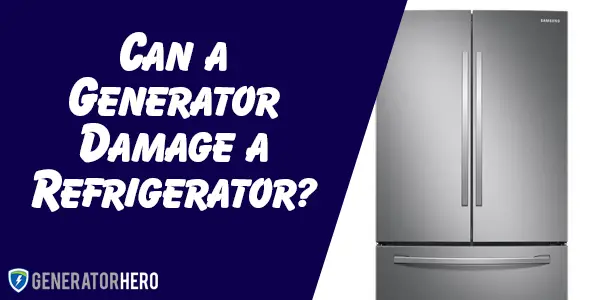A generator can be a lifesaver in a home to save food in a refrigerator or freezer when the standard power goes out. For many RVers, a fridge is a must to keep food cold or frozen during their camping experience. This article will cover the types of refrigerators and if damage to a refrigerator can happen from generator use.
Residential refrigerators come in various sizes, styles, and power needs. As for recreational vehicles, there are two types of refrigerators in recreational vehicles today. One is a residential-style or compressor-driven refrigerator, and the other is one created specifically for RV use, known as an absorption refrigerator.
Table of Contents
Compressor Refrigerator
A compressor-driven refrigerator, also known as a residential refrigerator, gets its power from AC/DC in a home or office. In an RV, it runs when the RV is plugged into shore power or from the coach batteries when it is not running by shore power. It is used primarily on large towables and Class-A motor homes.
They are often referred to as residential refrigerators because they are plugged into a wall as you would in a house. For this type of refrigerator to run in your RV, it needs an inverter—the inverter powers the unit from the coach batteries when there is no shore power.
A compressor refrigerator cools faster and operates more efficiently, and altitude does not affect its performance.
Absorption Refrigerator
While many larger RVs today have compressor-driven refrigerators, RV’s most common type of refrigerator is an absorption refrigerator. This type of refrigerator is designed for RV use and can run off LP gas or electric power. Some may refer to this type of refrigerator as a “2-way fridge.”
A “3-way fridge” is an absorption refrigerator that can run off AC, LP gas, and DC (house batteries), and it can run from shore power (or a generator), propane, or house batteries.
Higher altitudes may affect the performance of absorption refrigerators, and they tend to take several hours to cool when first turned on.
Running a Refrigerator on a Generator
Your home generator should have enough watt power to supply your home’s needs, including the refrigerator. To determine how many watts of energy it will take for your refrigerator, you can find that on the fridge’s operation manual or from our various generator wattage posts such as: What can you run on a 3500 watt generator?.
Today, larger towables and Class-A motor homes generally come equipped with generators and inverters. These inverter generators produce clean electricity to power appliances and sensitive electronics, and the inverter converts power from the coach batteries.
There is a more significant power draw when initially starting any refrigerator as it works to cool. A double door can use 7-8 amps or around 900-1000 watts for every 120V. After the refrigerator has cooled, it can run on 2-4 amps or 100-250 watts for every 120V.
Will a Generator Damage a Refrigerator?
If your generator does not have enough power to run your appliances, it could cause damage to your refrigerator. There are parts in your refrigerator-that could be damaged: compressor, expansion valve, or other electronic components.
If your RV has a permanently installed generator, know that its design meets all the needs of the RVs power.
If you purchased an after-market generator, you hopefully chose one with sufficient watt power for your home or RV.

FAQ
Is it safe to run a refrigerator on a generator?
Rest assured that using a generator to run your refrigerator is one of the safest power sources. There should be no problem if the generator you are using has enough watts of power.
If your RV comes equipped with a generator, know that its design meets all the needs of the RVs power.
If you purchased an after-market generator, you hopefully chose one with sufficient watt power for your unit.
How long can a refrigerator run on a generator?
As long as your generator has fuel, it will run. Every generator operates for a specified number of hours based on the size of its fuel tank.
[Note] If you have a permanently installed generator in your motor home that runs off the vehicle’s fuel tank, it will cease to operate if the fuel drops below the one-quarter tank level.
What size generator is safest for a refrigerator?
Your generator should have enough power to provide at least 1000 watts for your refrigerator. Be mindful that you will need additional watts to cover other appliances you use.
There is a more significant power draw when initially starting any refrigerator as it works to cool. A double door can use 7-8 amps or around 900-1000 watts for every 120V. After the refrigerator has cooled, it can run on 2-4 amps or 100-250 watts for every 120V.
Conclusion
As long as your generator is regularly serviced, maintained, and can produce enough watts of power, there should be no issues with running your refrigerator.

